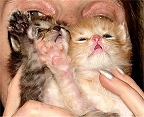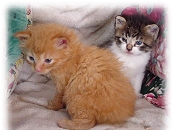|
Links to Infectious Diseases
Fading Kitten Syndrome
The first few weeks of a kitten’s life are crucial. They are fragile, helpless creatures who rely on their mother for nutrition as well as social education. Kittens that do not survive the first few weeks have been called “faders” or afflicted with “fading kitten syndrome.” About 20 to 40 percent of all kittens born will not survive past 12 weeks of age. After reaching 12 weeks, most kittens will continue to grow and develop.
Causes of kitten death in the first 12 weeks of life are generally linked to problems associated during development in the uterus, with the birth process or around the time of weaning.
>>Return to Top<<
Uterine Development Problems
Birth defects, which includes both genetic as well as drug or environmental causes, account for a large number of fading kittens. The easiest birth defect to detect would be malformation of the head, limbs, genital or anal area as well as a cleft palate. After birth, close thorough examination of the kitten, including examining the roof of the mouth, can help pick up on any potentially fatal birth defects.
Pregnant cats that are fed a low quality diet have a higher incidence of fading kittens. The kittens can be born weak, diseased and underweight. Some kittens will suffer from uterine malnutrition due to competition between other developing fetuses in very large litters.
>>Return to Top<<
Birth Process Problems
The delivery process can be quite traumatic for both the queen and the kittens. Extended labor and difficulty passing the kitten can result in potentially fatal injuries. Cannibalism at the time of delivery can also occur, leading to kitten death. Neglect of the newborn either due to a nervous, high-strung new mother or due to illness usually results in early kitten death.
>>Return to Top<<
Weaning Problems
In kittens, blood type problems can be devastating. If the mother and the kittens do not have the same blood type, serious illness including death can occur in the kitten. This phenomenon is not common since the majority of cats have similar blood types. Unfortunately, blood type concerns do occur more frequently in purebred cats. If the queen and kittens do not have compatible blood types, death of the kitten can occur within days to weeks of nursing.
Once the problem is diagnosed, future litters should be removed from that queen and orphan-raised. There is no treatment for the kittens already afflicted with the illness associated with blood type incompatibility. Other problems during nursing and weaning that can cause kitten death include various infectious diseases, bacterial and viral, as well as parasites.
>>Return to Top<<
Diagnosing Fading Kitten Syndrome
Kittens that do not survive beyond 12 weeks of age are generally diagnosed with fading kitten syndrome. These kittens can slowly deteriorate, stop nursing, and grow profoundly weak and thin.
The exact cause of the fading kitten is usually not determined. If more than 20 percent of the litter is affected, submitting a recently expired kitten for post mortem examination to determine the cause of death may be helpful in preventing additional kitten losses.
>>Return to Top<<
Treatment
Finding the cause of the fading kitten syndrome will help determine if any treatment will help. Birth defects and severe traumas are difficult to treat with a good outcome. Bacterial and viral infections can be treated, and with aggressive care, some of these kittens can survive.
Expect your veterinarian to recommend hospitalization, injectable fluid support, antibiotics and assisted feedings. If the kitten does not survive, post mortem examination in order to help the remaining litter is recommended.
>>Return to Top<<
Home Care
Early detection of fading kitten syndrome is essential. Thorough exam at the time of birth to detect any developmental defects is important. Daily weights are also crucial in monitoring the kitten’s development.
Make sure the queen is fed a high quality pregnancy diet and then a high quality nursing diet. Monitor the kittens closely for signs of trauma, cannibalism, weakness or neglect. Prompt veterinary attention for those suspect kittens is necessary.
>>Return to Top<<
Preventative Care
Certain numbers of kitten losses are unavoidable. Feeding the queen a high quality pregnancy diet and keeping her quite and calm can help. Detecting early signs of fading kitten syndrome with prompt veterinary care can help reduce the number of kitten deaths.
>>Return to Top<<
|


